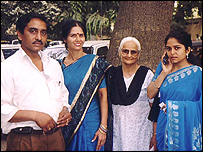|
By Lucy Ash
BBC Crossing Continents reporter
|

When Nisha Sharma had her groom arrested for demanding cash from her family, she put India's illegal - but thriving - dowry system in the spotlight. But other women have paid a very high price, sometimes even with their lives.

Nisha Sharma (r) is now an icon for many Indian women
|
Nisha Sharma's phone never stops ringing and her mantelpiece is crowded with awards and invitations. Young women call her for advice and she has received dozens of proposals from men willing to marry her without a dowry.
A few months ago Nisha was just an ordinary 21-year-old from Noida, just outside Delhi. Slim, pretty and barely five feet tall, she makes an unlikely rebel.
But in India her decision to send her groom packing after he asked for an extra $25,000 in dowry payment was seen as revolutionary.
 |
 Sundurahma said her husband poured kerosene over her and told her to die, doctors told me she would not last the week Sundurahma said her husband poured kerosene over her and told her to die, doctors told me she would not last the week 
|
The groom, Munish Dalal, seemed like a good match. Nisha's father had found him through a newspaper advertisement.
At first the groom and his family said they were not interested in any money or presents - they just wanted Nisha.
Paying and accepting dowry has been illegal in India for 40 years but it is still rampant. Nisha's father bought the couple a brand new car and dozens of household appliances.
On the big day, however, Munish and his mother Vidya suddenly demanded a cash dowry.
"When I said I didn't have that kind of money, they slapped and spat on me," said Mr Sharma.
Nisha immediately called the police who arrested Munish and his mother under the rarely enforced 1961 Anti-Dowry Act.
Both are in prison awaiting trial.
Nisha has no regrets: "My dad nearly had a heart attack and had to lie on the grass. Since they treated him so badly they probably would have done the same to me, or worse," she said.
"Now I've seen how greedy and cruel they are, I'm relieved Nisha is safe. If she'd married into that family they might have killed her." said her father.
Indian Government statistics show that husbands and in-laws killed nearly 7,000 women in 2001 over inadequate dowry payments.
'Bride burning'
Ranjana Kumari, who runs seven domestic violence refuge centres for women in Delhi, believes up to 70 cases a month are linked to rows over dowry.
"Sometimes women are tortured to squeeze more money out of their families and in extreme cases they're killed. Then the husband is free to remarry and get another dowry," she said.
This type of murder is often called "bride burning" in India.
Another women's group called Vimochana, based in the southern city of Bangalore, estimates that three to five women are taken to the Victoria burns unit at the city hospital every day suffering from massive burns.
The latest arrival is a young woman called Sundurahma who has 70% burns. She screams for her mother as the doctor forces her to sit up so he can examine the raw flesh on her back.
The only part of her body which is not badly burned are her feet. I notice a silver ring on one of her toes and immaculate nail polish.
Sundurahma said her husband poured kerosene over her and told her to die. Doctors told me she would not last the week.
In the hospital, there is another woman who has a crumpled photograph of her baby daughter on the pillow next to her head.
Asha has been married 18 months. She tells us that her husband took all her gold jewellery and then wanted money, so she went into the kitchen and drenched herself in kerosene.
At first she said he handed her the matches but then she changes her story and said the matchbox was empty.
Female foeticide
Dowries have become such a burden that many families are desperate to avoid having girls.
Pregnant women can determine the sex of the baby and abort the female foetuses with ultrasound technology.
 |
Indian legislation
Dowry Prohibition Act 1961 (amended in 1984 and 1986): bans paying and receiving dowries
Pre-Natal Diagnostics Techniques (Regulation and Prevention of Misuse) 1994 (amended 2002): bans sex determination tests
|
The 2001 census showed there are just 933 women for every 1,000 men in India. Legislation against sex determination tests was passed nearly a decade ago, but the practice is still widespread. Yet ID Swami, minister of state for home affairs, seemed unclear about his own laws.
He told me that sex determination tests are legal, then changed his mind, finally saying: "The husbands are in agreement about this, so are the wives and if there are no complaints then what can the government do?"
Nisha Sharma has sparked a new mood of defiance among Indian women. Several brides have followed her and reported their greedy grooms to the police.
"Nisha did a great thing because the dowry system is one of the worst things in our country and it is growing uglier by the day," one said.
BBC Radio 4's Crossing Continents will be broadcast on Thursday, 17 July, 2003 at 1100 BST.
